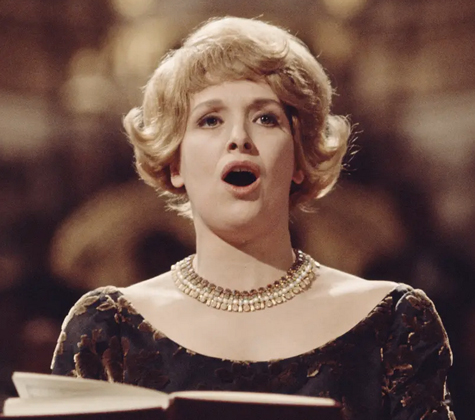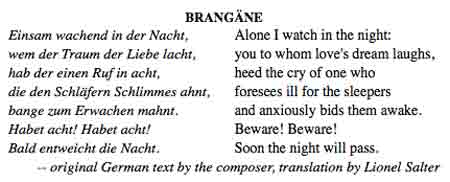(Can we make sense of Fricka and Wotan's final showdown in Die Walküre Act II without some experience of their clashes in Das Rheingold?)
Valhalla as painted in 1896 by scenic designer Max Brückner (who with
his younger brother Gottfried had designed for Wagner at Bayreuth)
his younger brother Gottfried had designed for Wagner at Bayreuth)
WAGNER: Das Rheingold: scene change from Scene 1 (from Flosshilde, "Haltet den Räuber!") to Scene 2 (through Wotan, "Vollendet das ewige Werk!")
At the bottom of the Rhine: Previously in Scene 1, the Nibelung ALBERICH, frustrated in his romantic overtures to the three RHINEMAIDENS, has stolen the Rhinegold and retreated to the murkiest depths of the river, pursued by the MAIDENS.
FLOSSHILDE: Stop the robber!
WELLGUNDE: Save the gold!
WOGLINDE and WELLGUNDE: Help! Help!
THE THREE RHINEMAIDENS: Alas! Alas!
[The waters sink down with them, and from the lowest depths ALBERICH's mocking laughter is heard. The rocks vanish in thickest darkness; the whole stage is filled from top to bottom with black waving waters, which seem to go on falling for some time.]
Orchestral interlude
Scene 2: The waves are gradually transformed into clouds and then, as an increasingly bright dawn light passes behind them, into fine mist. When the mist has completely vanished aloft into clouds, and an --
Open space on the mountaintop becomes visible in the light of dawn. The daybreak illuminates with increasing brilliance a fortress with gleaming battlements standing on a rocky summit in the background. Between this and the foreground of the stage a deep valley is to be imagined, through which the Rhine flows. WOTAN and beside him FRICKA, both asleep, are lying on a flowery bank at one side. The fortress has become completely visible.
FRICKA [awakening, catches sight of the fortress and shrinks back, astonished]: Wotan, husband, awake!
WOTAN [still quietly dreaming]:
The sacred hall of delight
has gates and doors to guard me:
Man's honor, eternal might
stretch out to endless fame!
FRICKA [shakes him]:
Up, leave your dreams, delightful illusions!
Awake, husband, and reflect!
WOTAN [awakes and raises himself a little; his gaze is at once drawn by the sight of the fortress]:
The eternal work is completed!
On the mountaintop the gods' fortress
rears regally aloft, resplendent edifice!
Just as I saw in my dreams,
just as my wishes intended it,
strong and beautiful it stands on show;
majestic, marvelous building!
-- libretto by the composer, translation (mostly) by William Mann
[Scene 2 at 3:23] Helen Donath (s), Woglinde; Edda Moser (s), Wellgunde; Anna Reynolds (ms), Flosshilde; Josephine Veasey (ms), Fricka; Dietrich Fischer-Dieskau (b), Wotan; Berlin Philharmonic, Herbert von Karajan, cond. DG, recorded in the Jesus-Christus-Kirche, December 1967
[Scene 2 at 3:02] Oda Balsborg (s), Woglinde; Hetty Plümacher (ms), Wellgunde; Ira Malaniuk (ms), Flosshilde; (laughing) Gustav Neidlinger (bs-b), Alberich; Kirsten Flagstad (s), Fricka; George London (bs-b), Wotan; Vienna Philharmonic, Georg Solti, cond. Decca, recorded in the Vienna Sofiensaal, Sept.-Oct. 1958
[Scene 2 at 2:54] Lucia Popp (s), Woglinde; Uta Priew (ms), Wellgunde; Hanna Schwarz (ms), Flosshilde; (laughing) Siegmund Nimsgern (b), Alberich; Yvonne Minton (ms), Fricka; Theo Adam (bs-b), Wotan; Staatskapelle Dresden, Marek Janowski, cond. Eurodisc, recorded in the Lukaskirche, Dec. 8-11, 1980
ANOTHER VERSION TK? (Pring-Bailey-Goodall? Ludwig-Morris-Levine?)
[Scene 2 at XXXX] XXXX (s), Woglinde; XXXX (ms), Wellgunde; XXXX (ms), Flosshilde; (laughing) XXXX (bs-b), Alberich; XXXX (s), Fricka; XXXX (bs-b), Wotan; XXXX, XXXX, cond. XXXX, recorded iXXXX
I love that our intrepid translator William Mann uses "fortress" as the term for what Valhalla is. Wagner's word is "Burg," most often rendered as "castle." But one of my German-English dictionaries indeed offers "castle, fortress, citadel," and while Wotan might take his pick among these options, there's no question that what Fricka sees -- as we would have learned if I hadn't so ruthlessly ended the clips here -- is pure "fortress."





